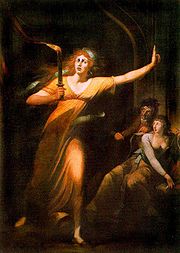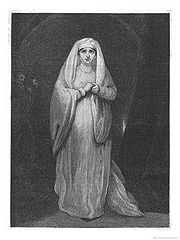
Sleepwalking scene (Macbeth)
Encyclopedia

William Shakespeare
William Shakespeare was an English poet and playwright, widely regarded as the greatest writer in the English language and the world's pre-eminent dramatist. He is often called England's national poet and the "Bard of Avon"...
's tragedy Macbeth
Macbeth
The Tragedy of Macbeth is a play by William Shakespeare about a regicide and its aftermath. It is Shakespeare's shortest tragedy and is believed to have been written sometime between 1603 and 1607...
(1607?). The first scene in the tragedy's 5th act, the sleepwalking scene is written principally in prose, and follows the guilt-wracked, sleepwalking Lady Macbeth
Lady Macbeth
Lady Macbeth may refer to:*Lady Macbeth, from William Shakespeare's play Macbeth**Queen Gruoch of Scotland, the real-life Queen on whom Shakespeare based the character...
as she recollects horrific images and impressions from her past. The scene is Lady Macbeth's last on-stage appearance, though her death is reported later in the act. Well known phrases from the scene include "Out, damned spot!" and "All the perfumes of Arabia will not sweeten this little hand." The British tragedienne Sarah Siddons
Sarah Siddons
Sarah Siddons was a Welsh actress, the best-known tragedienne of the 18th century. She was the elder sister of John Philip Kemble, Charles Kemble, Stephen Kemble, Ann Hatton and Elizabeth Whitlock, and the aunt of Fanny Kemble. She was most famous for her portrayal of the Shakespearean character,...
(1755-1831) was distinguished for her performance and interpretation of the scene.
Summary
The sleepwalking scene opens with a conference between two characters making their first appearances, the Doctor of Physic and the Waiting-Gentlewoman. The Gentlewoman indicates Lady Macbeth has walked in her sleep. She will not report to the Doctor anything Lady Macbeth has spoken in her somnambulistic state, having no witness to confirm her testimony.Carrying a taper, Lady Macbeth enters sleepwalking. The Doctor and the Gentlewoman stand aside to observe. The Doctor asks how Lady Macbeth came to have the light. The Gentlewoman replies that she has ordered that a light be beside her at all times (she is now afraid of the dark, having committed her crimes under its cover). Lady Macbeth rubs her hands in a washing motion. With anguish, she recalls the deaths of King Duncan
King Duncan
King Duncan is a fictional character in Shakespeare's Macbeth. He is the father of two youthful sons , and the victim of a well-plotted regicide in a power grab by his trusted captain Macbeth...
, Lady Macduff
Lady Macduff
Lady Macduff, a character in Shakespeare’s Macbeth, is the wife of Macduff, the Thane of Fife, and the mother of an unnamed son and other children. Her appearance in the play is brief: she and her son are introduced in Act IV Scene II, a climactic and tragic scene that ends with both her and her...
, and Banquo
Banquo
Banquo is a character in William Shakespeare's 1606 play Macbeth. In the play, he is at first an ally to Macbeth and they are together when they meet the Three Witches. After prophesying that Macbeth will become king, the witches tell Banquo that he will not be king himself, but that his...
, then leaves. The Gentlewoman and the bewildered Doctor exeunt, realizing that these are the symptoms of a guilt-ridden mind. The Doctor feels that Lady Macbeth is beyond his help, saying she has more need of "the divine than the physician". He orders the Gentlewoman to remove from Lady Macbeth the "means of all annoyance", anticipating she might commit suicide. Despite his warning, she suicides off-stage in Act 5, Scene 4.
Analysis
A.C. Bradley indicates that, with the exception of the scene's few closing lines, the scene is entirely in prose with Lady Macbeth being the only major character in Shakespearean tragedy to make a last appearance "denied the dignity of verse." According to Bradley, Shakespeare generally assigned prose to characters exhibiting abnormal states of mind or abnormal conditions such as somnambulism, with the regular rhythm of verse being inappropriate to characters having lost their balance of mind or subject to images or impressions with no rational connection. Lady Macbeth's recollections - the blood on her hand, the clock striking, her husband's reluctance - are brought forth from her disordered mind in chance order with each image deepening her anguish. For Bradley, Lady Macbeth's "brief toneless sentences seem the only voice of truth" with the spare and simple construction of the character's diction expressing a "desolating misery."Performances

John Philip Kemble
John Philip Kemble was an English actor. He was born into a theatrical family as the eldest son of Roger Kemble, actor-manager of a touring troupe. His elder sister Sarah Siddons achieved fame with him on the stage of the Theatre Royal, Drury Lane...
's 1794 Drury Lane
Drury Lane
Drury Lane is a street on the eastern boundary of the Covent Garden area of London, running between Aldwych and High Holborn. The northern part is in the borough of Camden and the southern part in the City of Westminster....
production starred his leading lady and sister Sarah Siddons
Sarah Siddons
Sarah Siddons was a Welsh actress, the best-known tragedienne of the 18th century. She was the elder sister of John Philip Kemble, Charles Kemble, Stephen Kemble, Ann Hatton and Elizabeth Whitlock, and the aunt of Fanny Kemble. She was most famous for her portrayal of the Shakespearean character,...
who offered a fiercely psychological portrait of Lady Macbeth. Siddons was noted for moving audiences in the sleepwalking scene with her depiction of a soul in profound torment. Siddons' interpretations contributed to the then new movement in literary criticism that focused on character as the essence of Shakespearean drama.
William Hazlitt
William Hazlitt
William Hazlitt was an English writer, remembered for his humanistic essays and literary criticism, and as a grammarian and philosopher. He is now considered one of the great critics and essayists of the English language, placed in the company of Samuel Johnson and George Orwell. Yet his work is...
commented on Siddons' interpretation and performance of the sleepwalking scene:
In coming on in the sleeping-scene, her eyes were open, but their sense was shut. She was like a person bewildered and unconscious of what she did. Her lips moved involuntarily—all her gestures were involuntary and mechanical. She glided on and off the stage like an apparition. To have seen her in that character was an event in every one's life, not to be forgotten.

